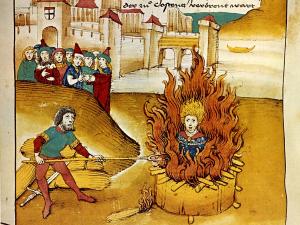
Before the age of social media, accusations of heresy were far less common among believers. Don’t get me wrong, some were eager to point accusing fingers at their brothers and sisters but doing so came at a cost, because those brothers and sisters were probably part of the same local church or group of churches.
Social media has afforded billions of people the opportunity to make lazy, consequence-free assertions about people of their own faith, and boy does it happen a lot, especially on inter-faith discussion forums like Patheos. Today, I want to explore what beliefs a person has to abandon before the Bible indicates they are no longer part of the flock. I’m not talking about verses that define poor behaviour or warnings against sin – I’m talking about stark, clear warnings about what it means to abandon the faith. To the best of my understanding, there are only a few such boundaries:
Claiming that Jesus has already returned (as an identifiable human being)
Matt 24: 23-25
At that time if anyone says to you, ‘Look, here is the Messiah!’ or, ‘There he is!’ do not believe it. For false messiahs and false prophets will appear and perform great signs and wonders to deceive, if possible, even the elect. See, I have told you ahead of time.
Denying that Jesus came in the flesh
2 John 1: 7-8
I say this because many deceivers, who do not acknowledge Jesus Christ as coming in the flesh, have gone out into the world. Any such person is the deceiver and the antichrist. Watch out that you do not lose what we have worked for, but that you may be rewarded fully.
Denying the life, death, and resurrection of Christ
1 Cor 15: 1-11
Now, brothers and sisters, I want to remind you of the gospel I preached to you, which you received and on which you have taken your stand. By this gospel you are saved, if you hold firmly to the word I preached to you. Otherwise, you have believed in vain.
For what I received I passed on to you as of first importance: that Christ died for our sins according to the Scriptures, that he was buried, that he was raised on the third day according to the Scriptures, and that he appeared to Cephas, and then to the Twelve. After that, he appeared to more than five hundred of the brothers and sisters at the same time, most of whom are still living, though some have fallen asleep. Then he appeared to James, then to all the apostles, and last of all he appeared to me also, as to one abnormally born…Whether, then, it is I or they, this is what we preach, and this is what you believed.
Denying the resurrection of the dead
1 Corinthians 15: 12-19
But if it is preached that Christ has been raised from the dead, how can some of you say that there is no resurrection of the dead? If there is no resurrection of the dead, then not even Christ has been raised. And if Christ has not been raised, our preaching is useless and so is your faith. More than that, we are then found to be false witnesses about God, for we have testified about God that he raised Christ from the dead. But he did not raise him if in fact the dead are not raised. For if the dead are not raised, then Christ has not been raised either. And if Christ has not been raised, your faith is futile; you are still in your sins. Then those also who have fallen asleep in Christ are lost. If only for this life we have hope in Christ, we are of all people most to be pitied.
Denying that Jesus will return
2 Peter 3: 3-9
Above all, you must understand that in the last days scoffers will come, scoffing and following their own evil desires. They will say, “Where is this ‘coming’ he promised? Ever since our ancestors died, everything goes on as it has since the beginning of creation.” But they deliberately forget that long ago by God’s word the heavens came into being and the earth was formed out of water and by water. By these waters also the world of that time was deluged and destroyed. By the same word the present heavens and earth are reserved for fire, being kept for the day of judgment and destruction of the ungodly.
But do not forget this one thing, dear friends: With the Lord a day is like a thousand years, and a thousand years are like a day. The Lord is not slow in keeping his promise, as some understand slowness. Instead he is patient with you, not wanting anyone to perish, but everyone to come to repentance.
But the day of the Lord will come like a thief. The heavens will disappear with a roar; the elements will be destroyed by fire, and the earth and everything done in it will be laid bare.
Relying on our own righteousness for salvation (rather than receiving the gift of righteousness in Christ)
Gal 1: 6-8
I am astonished that you are so quickly deserting the one who called you to live in the grace of Christ and are turning to a different gospel— which is really no gospel at all. Evidently some people are throwing you into confusion and are trying to pervert the gospel of Christ. But even if we or an angel from heaven should preach a gospel other than the one we preached to you, let them be under God’s curse!
Paul clarifies what this ‘other Gospel’ is in Gal 2: 3-5
Yet not even Titus, who was with me, was compelled to be circumcised, even though he was a Greek. This matter arose because some false believers had infiltrated our ranks to spy on the freedom we have in Christ Jesus and to make us slaves. We did not give in to them for a moment, so that the truth of the gospel might be preserved for you.
And again, later in the chapter. Gal 2: 16b
So we, too, have put our faith in Christ Jesus that we may be justified by faith in Christ and not by the works of the law, because by the works of the law no one will be justified.
The act of circumcision was an example of returning to Law – believing and practicing that we are justified by following Hebrew Law (or any definable standard) rather than by accepting the abundant gift of righteousness through the cross.
Boundary lines in pleasant places
Establishing boundaries is a fundamental healthy and helpful thing. In all the years of deconstruction, I never felt led by the Spirit of God to question any of the above, but to remain within the comfort and provision of belief in Christ. I believe he came in the flesh, is the Son of God, lived and ministered as we read about in the gospels, died to reconcile humanity to God, went to Hell, rose again, was seen by many witnesses, including his disciples, ascended, and will one day return. And I rely entirely on the gift of grace for righteousness, supplied to us through the cross.
This is a relatively short list of true boundaries, allowing me to embrace Christians with vastly differing views as brothers and sisters, including those who attack me for some of my more progressive positions. As long as someone’s faith falls within the boundaries above, they are family to me, including Protestants, Catholics, Reformists, Baptists, Lutherans, Presbyterians, Pentecostals, Charismatics, Methodists, Calvinists (the group I have the most friction with), Progressives, and any other group I’ve temporarily forgotten. We will fellowship together in Heaven, when our reconciliation will be complete, so why not begin now?
The importance of compassion and authenticity
To be clear, crossing the line into heresy doesn’t make a person a less worthy recipient of divine or Christian love, but it is helpful to understand where that line is for those within the faith, as well as those whose beliefs have evolved to the point where they find themselves beyond the outer boundaries of Christendom. In the absence of judgement, clarity is useful for everyone.
Comforting though it is to have clear boundaries, I won’t reject a person because they’ve strayed beyond a fundamental tenet of Christian belief. There was a time in my life when I questioned pretty much everything, and I respect others’ right to do the same, trusting the Spirit of God to lead them as faithfully as he has led me. I accept apostates and heretics entirely, because there’s no point being anything other than authentic on the journey of faith, even if it leads you down some dead ends. Ultimately, we have to trust God to reconcile all people to himself. There’s nobody we are permitted to despise or judge because of their theology – we serve a God of love, after all, and mercy will triumph in the end. Besides, heretics are interesting and many Christians stopped thinking many moons ago. It’s good to have your faith challenged and to ask difficult questions, and we can all learn from those with different beliefs. It’s also worth noting that the boundaries defined above leave a lot of room for questioning, including about the nature of judgement, universal salvation, institutional religious misogyny, Biblical inerrancy, LGBTQ+ inclusion, and much more. We can and should ask the key questions Christians have ignored for too long with courage, being willing to grow and change.
For me, though, it’s helpful to have a set of boundaries in mind that determine how I interact with other people when it comes to spirituality. There are those with whom I can be completely at ease, letting down all my barriers and abandoning myself to unfettered fellowship, including spiritual intimacy through times of prayer. And then there are those I love equally much but am more careful with, listening to the Holy Spirit to ensure I’m not influenced by unhelpful ideas. As a Christian, the heart of my faith is the love of Jesus – my eyes are on him at all times, and I expect similar adoration from other believers. If someone calls themselves a Christian but rarely if ever talks about Jesus, it poses a question about the true nature of their faith. If anyone reading this has truly abandoned a focus on Jesus as the heart and soul of their faith, and has strayed beyond the outer boundaries listed above, then I respectfully suggest they ask themselves if it’s authentic to continue to label themselves a Christian. It might be more courageous and helpful to all involved for every person to accept where they are in their journey, without judgement.
The ultimate goal of the Gospel is the complete unity of all human beings under Christ, and in that spirit, I encourage readers to lower accusing fingers and to look for the good in other people instead, no matter the difference between their views and your own. Ephesians 1:8-10:
With all wisdom and understanding, he made known to us the mystery of his will according to his good pleasure, which he purposed in Christ, to be put into effect when the times reach their fulfilment – to bring unity to all things in heaven and on earth under Christ.













